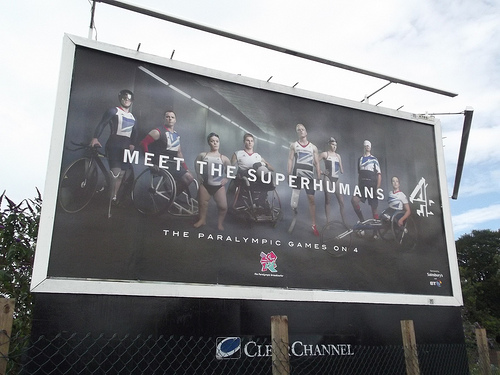


England’s wave of enthusiasm for Olympic competition is expected to carry over into the Paralympic games, which start tomorrow. At least Channel 4 is hoping that’s the case; the British television network has committed to more than 500 hours of coverage across its broadcast and online properties and, as we noted yesterday, invested £600,000 in training people with disabilities to be on-air analysts for the events.
But coverage of any major sporting event is not complete unless it also has a fancy package of high-tech graphics. These are especially helpful in delivering information about an event and its competitors in pubs and other venues where large crowds gather to watch athletic events with the sound muted. On the eve of the opening ceremonies several reporters covering the games are looking at a new system that will help make some events more accessible to its viewers.
The Lexicon Decoder system, or simply LEXI, will be used to help explain how different disabilities are evaluated when matching up competitors. The Observer reporter Maggie Brown likens it to traffic lights in her article, with figures in the computerized diagrams colored red, orange, yellow, or green to indicate the severity of an athlete’s impairment. LEXI’s inventor, Giles Long, tells Brown the effectiveness of the system lies in its simplicity and familiarity:
It’s about boiling down what people sitting on the sofa need to know in an instant, at the point of the race… You see diagrammatic figures everywhere — tube, bus, road signs, we are using everyday language but applying it an accessible way. I know the people competing in the Games won’t find them shocking at all.
Long, who won a gold medal as a butterfly swimmer in the 1996 Paralympics held in Atlanta, says he came up with the idea for LEXI during the 2000 Paralympics in Sydney, Australia, when he discovered that even some of his close friends were confused by the classification system. In an interview with Daily Mail reporter Martha Kelner, Long says he enlisted the help of his father, a graphic designer, to develop the system and then sold it to Channel 4, which has also hired him a correspondent for the swimming events.
Swimming is one of the more difficult Paralympic events for viewers to decipher, Long tells Kelner, because the athletes competing against each other often seem to have very different disabilities. But success is all about an athlete playing to one’s strength better than his or her competitors, and once the viewers understand that the playing field is level, they can better enjoy watching how the event unfolds.
In addition to swimming, LEXI will be used in coverage of the cycling, athletics, table tennis, wheelchair rugby, basketball, and volleyball. If you’re fortunate enough to be in a part of the world that can broadcast the Channel 4 coverage of the games, share your thoughts on how they work in the Comments section below.
Image by Elliot Brown.